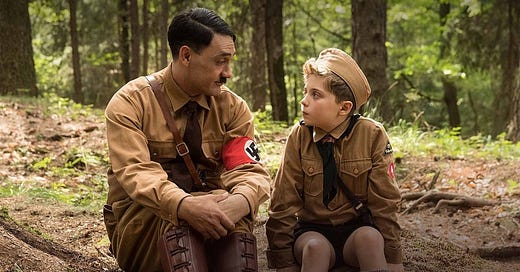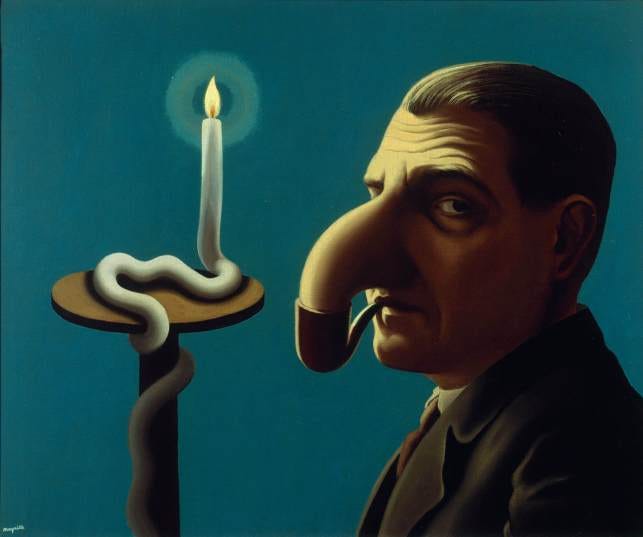Beauty in Silliness, Silliness in Trauma
I'm pretty sure Taika Waititi, Magritte, and limericks all have this in common
First, a brief announcement! Barnes and Noble is holding an awesome 25% off pre-order sale, which this time includes Monster Tree!! This is a great chance to get your future self or someone you love a little present that costs less than the salmon sushi I doordash to myself too often. The sale only lasts till tomorrow, so get on it now!
Writers are sometimes asked what is the best thing someone can do to support them. The answer? Preorders. Preorder numbers tell the publisher, booksellers, etc. that there is interest in the book, and interest begets interest. Many of your favorite authors have preorders available through this sale, too, so check them out! And thank you 3000!
Now to business.
So Silly Its Serious
When I saw JoJo Rabbit in theaters several years ago, I thought even while I was watching, this is going to be my favorite script of the decade. I was not wrong.
I was absolutely blown away by the combination of devastation and silliness. Not just that, but the way the script completely, fully, leaned in to both. It doesn’t get sillier than Rebel Wilson pointing to her uterus and saying in a Kiwi-Deutsch accent, “I’ve had eighteen babies for Germany.” It doesn’t get more devestating than those shoes. You know what I mean.
If films are a recipe, I’ve long thought that Taika Waititi makes exactly the kind of food and uses exactly the kind of ingredients I like to use. In his most serious stuff, I still laugh. In his silliest stuff, there’s still a scene where I bawl.
However, Jojo Rabbit, though widely acclaimed, is still pretty devisive. There are plenty of people who, validly, are uncomfortable mixing their sweet and savories, their sillies and their agonies. There are plenty of people who, also validly (except no cuz they’re wrong), don’t mind the mixing, but just don’t like Taika’s way of doing it. Even the picture above is from a review in the Atlantic saying Taika didn’t get the balance right.
All I know is what I experienced when I saw that movie. And what I still experience thinking about it.
To me, in creating and consuming, I think silliness is the seasoning that makes any other flavor go down easier. If something is extra sweet, silliness can be the tartness to cut through it a bit. If something is thick and heavy, silliness is the cream to lighten it up, so you can handle it a bit easier. Obviously there are many different pallets, and not everyone agrees. This just happens to be my favorite flavor combination to cook, and my favorite flavors to eat. Give me those heavy french fries with that silly Frosty all day every day.
Obviously Taika Waititi is by no means the only cook to flavor his dishes this way. We’ve known the potency of the silly-drama mixture since…what, probably the Greeks? Does Oedipus tell jokes? Probably not after…well, you know. Anyway, lots of artists create this way. Phoebe Waller-Bridges said, “I try to disarm an audience as much as I can with comedy and then punch them in the gut with a drama when they least expect it.”
I think this is why comedians like Robin Williams and Jim Carrey are actually some of my favorite dramatic actors, when they get the chance. I think this is why I adore an artist like Magritte. I mean…whatever else they are, and they’re a lot, some of his paintings are downright silly, aren’t they? Beautiful. And silly.
Maybe all of this is just to say that I take my silliness seriously? And my seriousness sillily?
And now, considering that April is National Poetry Month, let’s talk silly-serious poetry.
Probably the most Serious, the most Official, the most Grand of the poetic forms is the sonnet, yeah? So it’s no surprise that my absolute, hands-down, all-time favorite sonnet is a silly one. One that makes fun of Serious Sonnets. But then is also completely serious at the same time, too?
Of course I mean Shakespeare’s Sonnet 130, and if you haven’t yet heard it read by Sir Alan Rickman, bless your ears and your life.
And then there’s the opposite end of the spectrum.
The poetic form that refuses to take itself seriously. The poetic form that took Serious Poetry and turned it on its silly head, and has then been turned on its own head over and over. With that said…
Let’s talk about limericks!
10 Lovely Limericks!
1. Can limericks be serious?
When I was writing a verse novel, I wanted to use all types of poetic forms, including limericks. But this was a scary book, and I wanted to see if a form as silly as limerick could be other things too. Serious and scary. This was my attempt…do you think it works?

2. Where do limericks come from?
Limericks are actually pretty new, relatively speaking. Only been around since the 18th century. They were popularized by Edward Lear in his A Book of Nonsense, but actually the real inventors were probably gaelic minstrels who used the form to insult each other. Of course.
3. What about the city?
The City of Limerick is the fourth most populous city on the island of Ireland. But is the poetic form related to the city? It’s actually not entirely clear where exactly limericks started, but it’s believed it comes from an 18th century Irish soldiers song called “Will You Come Up To Limerick?” Limericks and drinking songs are…very close relatives, shall we say.
4. How about some examples.
Ok, it’s about time we just read some fun limericks, right? Here are 20 compiled by Readers Digest, and yes, you naughties, we’re sticking with the kid friendly ones today.
5. Limerick Contest!
The Saturday Evening Post is having a limerick contest based on an beautiful George Hughes cover illustration. It’s due April 25th, so you still have a few days to get your best Hughes-inspired limerick together and submit!
6. Shakespeare’s Limerick
Yup, even The Bard wrote one. It’s a drinking song that Iago sings in Othello, and it’s definitely a limerick:
“And let me the canakin clink, clink; And let me the canakin clink: A soldier’s a man; A life’s but a span; Why then let a soldier drink.”
7. Math Is Poetry, Poetry is Math
Leigh Mercer did something magical…turned a math equation into a limerick. Here it is:
A dozen, a gross, and a score
Plus three times the square root of four
Divided by seven
Plus five times eleven
Is nine squared and not a bit more.
8. Limerick picture Books!
I went to the expert for this one.
of Can We Read gave me a couple amazing limerick picture books and honestly, they look spectacular. Definitely adding to my list.9. Moooooo!
I’m recommending Moo by Sharon Creech today for a few reasons. First, Sharon Creech is a long-time gold standard middle grade writer for me. Secondly, this book mixes poetry and prose in a beautiful way, as it mixes silly and serious. Perfect for our beautiful sillies today.
10. Teacher Resources:
Teachers, librarians, and homeschool parents, I’ve got some fun limerick activities and lesson plans for you and your students!
How To Write Limericks for grades 5-8.
St. Patrick’s Day Limerick Activity for grades 3-5.
Limerick Leprechaun CVS Activity for grades PreK-1
I would love to do a free virtual Q&A with your class or book group! If you’re interested in scheduling a visit you can reach out to me via my website. Let me know how I can support you! I’ve also got free classroom resources to accompany each book. You guys are rock stars!
Thanks for coming along everyone! The Smorgasbord is a hand-kneaded, hand-shucked, reader supported publication. You can support by buying a delicious book or by becoming a paid subscriber. It seriously means the world, you shining star you.
-Sarah













1. Yes, it works! Serious and scary has a long tradition.
2. Thank you for the shoutout!
3. I don't know this book of Sharon Creech's (how?) so thank you.